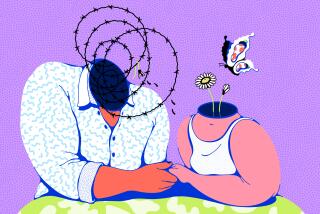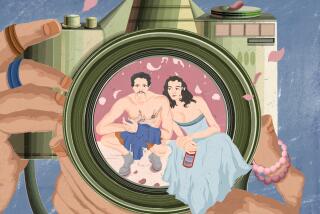Therapists Admit Sex Lure : 87% of Psychologists in Poll Drawn to Clients
- Share via
When a psychotherapist is in session, does he or she ever feel attracted to the client? What would cause such an attraction? How frequently does it occur among all therapists and not just among those who violate the prohibition against sexual contact with their clients? Do therapists become uncomfortable, guilty or anxious when they experience such feelings? Do they tell their clients of their attraction or hide it from everyone, including their colleagues and supervisors?
These questions have never been asked of psychologists before. Perhaps because of the longstanding taboo associated with client/therapist sexual intimacy (and the results of such a relationship to the patient, which include feelings of ambivalence, guilt, isolation, sexual confusion and an inability to trust), psychologists have been reluctant to reveal or examine their sexual thoughts or fantasies about their clients--even if the therapists have no inclination to act upon those feelings.
A new study, however, has undertaken to map out some of this previously uncharted territory. Questions about sexual attraction to clients were posed in a national survey of clinical psychologists undertaken by Kenneth S. Pope, a clinical psychologist in private practice in West Los Angeles, former chairman of the California State Psychological Assn.’s Ethics Committee and current member of the American Psychological Assn.’s Ethics Committee, with Patricia Keith-Spiegel and Barbara G. Tabachnick, both at Cal State Northridge.
The results, recently published in the American Psychologist, the official journal of the American Psychological Assn., come as a surprise. Pope mailed a questionnaire to a random sampling of the association membership. Of the 585 psychologists who responded, 87% (95% of the men and 76% of the women) reported having been sexually attracted to their clients, at least on occasion. Sixty-three percent felt guilty, anxious or confused about the attraction, and about half of the respondents received no guidance or training on this issue. Only 9% of the respondents felt their training was adequate concerning attraction.
Some of the other findings were that women therapists were more likely to feel attracted to clients of the same sex than men and that certain stereotypes hold true in the attraction. For example, male therapists reported having more sexual fantasies than did female therapists, and younger therapists were more likely to have had such fantasies than older therapists. More men than women gave “physical attractiveness” as the reason for the attraction, while more women therapists felt attracted to “successful” clients.
The vast majority in this study--93.5% of the respondents--have never “acted out” sexually with their clients, stating that such activity was “unethical,” “exploitative,” “unprofessional” and “against the therapist’s values.” Of the remaining 6.5% who had been intimate with their clients, male therapists outnumbered females four to one.
The study was an outgrowth of psychologist Pope’s previous research on therapist-client sex and teacher-student sex and part of a new book that he co-authored with Jacqueline Bouhoutsos to be published this fall entitled “Therapist-Client Sexual Intimacy” (Praeger).
“In looking for ways to prevent therapist-client sex from happening, and to understand how it happens,” he explained in a recent interview, “it occurred to me that the topic of attraction to patients has been absolutely taboo. It is not discussed in training programs on the whole--the evidence we got from the survey bears that out. Attraction to clients is sort of a gray area. It suffers from guilt by association--if you even think about it, it’s almost as if you’ve broken the law.”
One of the major problems that Pope’s research brings up for clinicians and patients alike is that if so many therapists are feeling this toward at least some of their patients, how important is it to acknowledge the feelings openly?
“To what degree does it affect the integrity of the relationship?” Pope asked. “That’s a terribly difficult question but we now have to confront it because this is not a minor phenomenon; it stops just one step short of being universal.
“And it raises a lot of other questions that can make both the therapist and the client uncomfortable. If a client asks, ‘Are you sexually attracted to me?’ does the therapist self-disclose or not? And if he or she fails to tell the truth, I would think it could cause profound injury to the therapy. Freud once said one of the fatal things that could happen to the therapy is if the therapist ever lies to the patient. And even if the therapist doesn’t disclose his or her attraction verbally and explicitly, will it not be communicated in other ways? Freud said it’s impossible for anyone to keep a secret. Our non-verbal behavior just oozes out of us.
“On the other hand, how does it affect the therapeutic needs of the patient? What if one is not attracted? And if the client has very low esteem, will he or she experience this as abandonment or rejection?
Need for Research
“I think one of the big issues here is that on most other difficult questions of therapy, you have the research, the literature to refer to. Therapists are able to maintain an appropriate perspective. On this topic, there is a virtual absence of research. In addition, this is a profoundly personal feeling that’s often associated with being vulnerable. Given the history that this has been an absolutely taboo topic, are therapists going to blush and stammer when asked by their patient about their feelings in this area?”
Clinical psychologist Bouhoutsos has been researching sexual intimacy between therapists and patients for eight years. She is the current chair of the Ethics Committee of the California State Psychological Assn. and the association’s former president. She acknowledges that she has experienced attraction to some of her clients. “Of course,” she said in a telephone interview. “It’s a nice feeling. I don’t do anything about it, but I am aware of it. It’s my feelings--not the patients’--and I certainly wouldn’t want to burden them, nor is it appropriate to do so.”
Bouhoutsos spoke of the naturalness of sexual attraction. “It’s normal to feel these feelings. There is no reason to have guilt if one is sure of one’s own standards and ethics and knows what is happening. I could say that it’s poor practice to reveal those feelings, but I can’t make a blanket statement. It depends on the context.
“If the client says, ‘I’m very attracted to you and I’m having trouble with this,’ then there might be a reason to share your side. However, that’s not the reason for therapy. The task at hand is something else. Relating sexually to another person is usually done between two people who are equal power-wise. When you’re in therapy, the therapist assumes the role of a parent. . . .
“One uses the client’s feelings as grist for the therapeutic mill and to discuss how that relationship is different from a romantic relationship. The focus is on the client’s feelings, not the therapist’s.”
Training Programs
Pope said that the psychological establishment has much to do in dealing positively with therapists’ sexual attraction to their clients. “First,” he explained, “training programs must acknowledge that this attraction occurs and that it’s not some terrible aberration or that it means you’re about to have sexual relations with your client. Second, we must begin to work out some sensible theories and work them into our existing theories on the therapeutic relationship. Third, we need to do some research on how it affects therapy, if at all. Fourth, we need to make people feel safe in dealing with it by establishing specific guidelines.”
And perhaps most important, Pope and his co-researchers Keith-Spiegel and Tabachnick assert in their study that “therapists and therapists in training must be acknowledged as fully human, as capable of feeling sexual attraction to those to whom they provide professional services. The taboo (on feeling attracted) must be lifted.” However, Pope emphasized strongly that no matter what the feelings of the therapist or the client, therapist-client sexual intimacy is in all cases unethical and clinically unacceptable.
More to Read
Sign up for Essential California
The most important California stories and recommendations in your inbox every morning.
You may occasionally receive promotional content from the Los Angeles Times.













